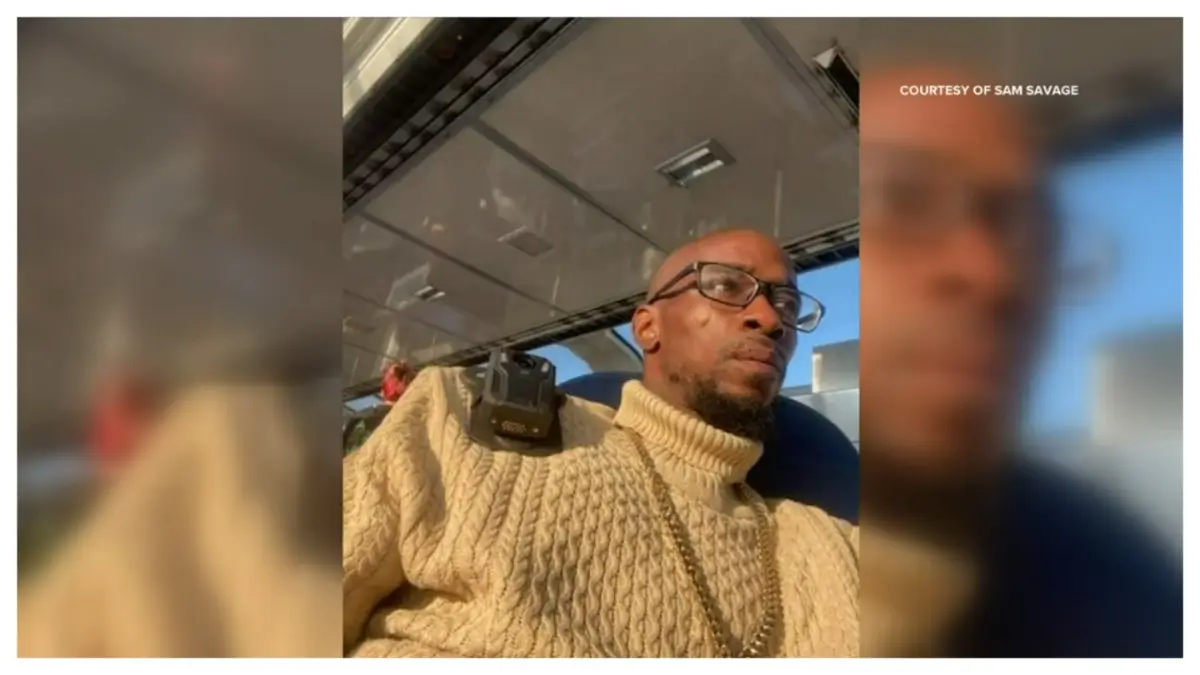Seventy years after Rosa Parks refused to give up her seat on a Montgomery bus, a Black man says he faced the same situation in Fargo, North Dakota, where the driver told him to move seats even though the bus was almost empty.
Xavier Davis was heading home to Minnesota when a Jefferson Lines driver instructed him and another Black passenger to move to the back. White passengers were allowed to sit where they wanted, he said. The driver threatened to call police when the two objected.

Last week, as the two-year anniversary of the incident approached, Davis filed a lawsuit in Hennepin County District Court, accusing company and the driver of racial discrimination.
“This is a true story in 2023,” Davis told The Forum at the time. “I’ve seen it on TV. I’ve seen it in the history books, but I never actually had a white person tell me to go to the back.”
The driver didn’t ask anyone else to move—just Davis and another Black passenger, Jarvis Greenhill, who happened to board at the same time but was headed to a different city. “Back in the day, that would have been OK,” Davis said. “Today? No. We’re paying customers just like everyone else.”
The lawsuit follows a Minnesota Department of Human Rights investigation that found probable cause that Davis was singled out because of his race.
“In 1955 Rosa Parks took a stand and we are not going back, not ever again,” said Davis’ attorney Sam Savage. “They are refusing to take accountability, and the only thing we can do is make it right by awarding him full money justice. That’s the only justice available.”
The incident occurred on July 13, 2023, when Davis boarded a Jefferson Lines bus in downtown Fargo with Greenhill. The driver — identified by Jefferson Lines as Koby McFarlane but listed as “John Doe” in the complaint — told both men to sit at the back of the bus.
When they objected, the driver insisted it was company policy to board passengers from back to front. White passengers were allowed to sit wherever they liked. A video Davis shared with The Forum shows the driver threatening to call police if the two men didn’t comply.
Reluctantly, both men moved. Later, the driver would claim he believed the two Black men were traveling together and smelled like marijuana — assertions the Human Rights Department concluded were based on “discriminatory and stereotypical expectations.”
Commissioner Rebecca Lucero wrote in a January 2025 memo that the driver’s actions were “rooted in the trope that a Black man questioning Driver’s decision was somehow threatening or disruptive.” She found no evidence that Davis did anything to warrant police involvement.
According to the memo, Jefferson Lines failed to provide any legitimate, non-discriminatory reason for the driver’s behavior. The company told Davis after the incident that their policy was to seat passengers on a first-come, first-served basis, directly contradicting the driver’s justification.
McFarlane, in his incident report, doubled down, citing passenger comfort and his personal preference for back-to-front boarding to avoid people being hit by luggage in the aisle. Jefferson Lines issued McFarlane a verbal warning one month later for violating the company’s seating policy.
Four months after the incident, Davis filed a complaint with the Minnesota Department of Human Rights. The lawsuit filed this week seeks damages “far in excess of $50,000” for emotional distress, as well as punitive damages and a civil fine. The complaint argues that the discrimination was especially egregious given the symbolic weight of bus seating in the history of American civil rights.
“Directing a black person and only a black person … to sit in the back of the bus given the iconic status of Rosa Parks’ act of civil disobedience, and subsequent social movement, is direct evidence of discrimination in the context of American history,” Savage wrote in the complaint.
A trial could take place as early as late 2026. Davis and his legal team have tried for months to reach a resolution through mediation, but Jefferson Lines has declined to settle. “They just are unwilling to do the right thing,” Savage said.
Jefferson Lines, one of the largest bus companies in the U.S., operates in 14 states. The company’s chairman, Charlie Zelle — who also chairs the Metropolitan Council — told the Star Tribune he no longer oversees daily operations. A company spokesperson said they could not comment on pending litigation but added, “We remain committed to addressing this matter through the appropriate legal channels.”
The lawsuit isn’t the first time Jefferson Lines has faced such accusations. In 2009, Michelle Jordan said a driver told her and her 3-year-old daughter to sit in the back of the bus on a trip from Minneapolis to Milwaukee. Jordan, the only Black passenger on board, refused. They were kicked off in Abbotsford, Wisconsin, and left outside a convenience store while the driver called police.
As Davis pushes forward with his lawsuit, he does so not just in pursuit of damages — but to make a broader point.
“Ms. Parks’ defiance has become iconic as a symbol of resistance to racial injustice and has been universally praised,” Savage wrote. “We are not going back.”
Great Job A.L. Lee & the Team @ Atlanta Black Star Source link for sharing this story.


